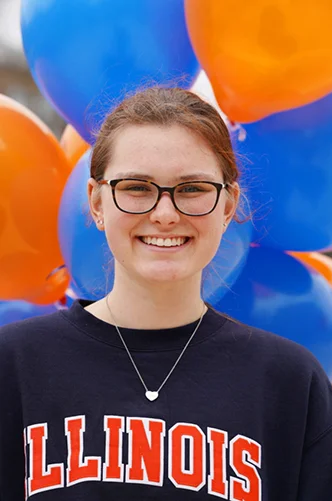
Elizabeth Scherschel (she/her) is a junior in classics, with minors in history and anthropology. On campus, she is involved with the Student Alumni Ambassadors, the Stamps Scholars program, and the Writers Workshop.
I started college as a student in the Division of General Studies, which enabled me to explore every field and every college. My first semester schedule had me criss-crossing campus; I took courses in Applied Health Sciences, in Grainger, in Gies, and in LAS. I struggled, at first, to find my academic home on this huge campus. Every college and every department had something to offer, and as I hadn’t finalized my post-graduation plans, I was a free agent and eager to explore everything. Each department had its strengths, but I came to realize that I had to find where I personally would thrive most. Eventually, I found my home in the Department of Classics within the College of Liberal Arts & Sciences.
I chose classics because I loved the ancient history and language courses I had taken and the supportive network of instructors, advisors, and other students I had found. More broadly, out of all the departments and colleges I had explored, I chose classics in LAS because it encouraged an interdisciplinary approach—majors conducive to double majoring and finding minors, the flexibility to study within and across programs, and advisors and professors who encouraged exploration. Case in point: when she found out I enjoyed taking physics classes, my then-advisor in classics gave me information about a physics minor and encouraged me to think about it, despite the fact I had no intention of pursuing a related graduate program or career. She encouraged me to follow my passions, and the classics program allowed for that exploration—while I made progress in my degree, I also enriched my personal and academic growth with classes in other fields.
Since declaring a classics major, I’ve remained confident in that decision. I’ve built relationships with my professors and classmates, and I’ve both explored my academic interests and built a larger understanding of the world as a whole. I also added a history minor and an anthropology minor to my studies, both of which nicely complement my classics focus while adding a unique perspective to it. Through my anthropology classes, I’ve had the chance to learn more about how language is used and morphs over time, to investigate the recovery and recognition of both human and animal remains, and to explore worldwide burial practices and beliefs about death across time. In my history courses, I have had the chance to analyze text, to explore the significance of context, and to further develop my research skills. My instructors have encouraged me to build and recognize connections between what I’ve studied through class discussions and assignments.
Through LAS’s emphasis on participation both in the classroom and beyond, I have built personal relationships with other students and with faculty and staff. From the curriculum and LAS’s interdisciplinary approach, I have learned how to approach complex ideas, to ask questions, and to write with a variety of purposes. As I look ahead to studying abroad, writing my senior project, and graduating, I know my undergraduate experiences have prepared me well, and that the connections I have made and the skills I have developed will persist long beyond my time here.
Editor's note: This story first appeared on the College of LAS website as an LAS Insider blog post.